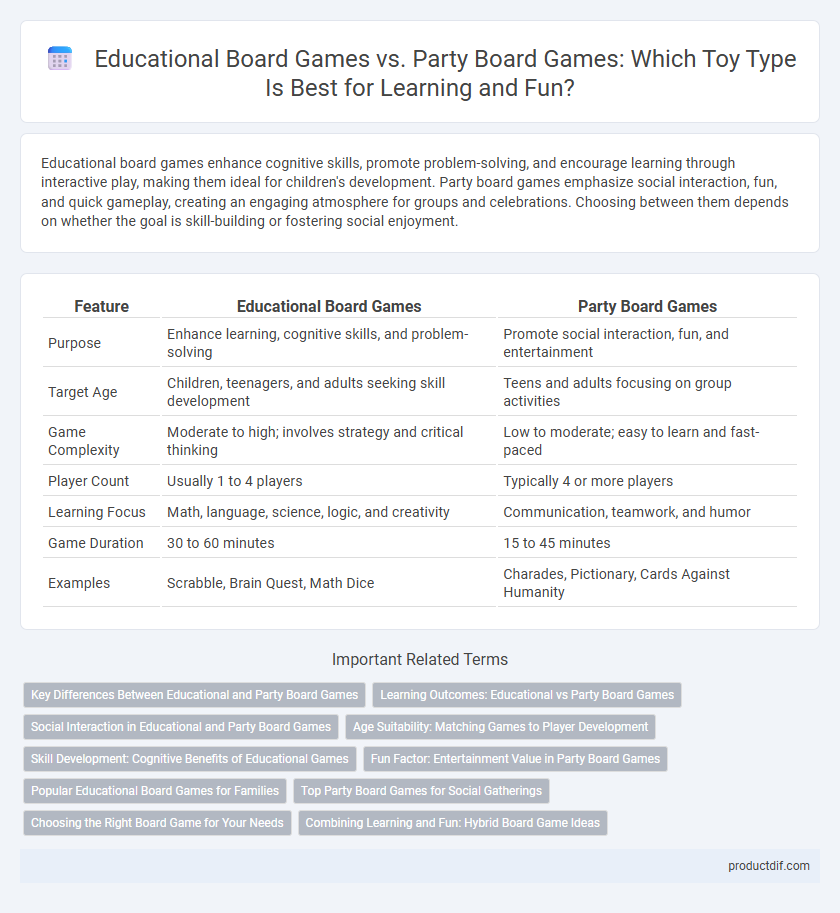Educational board games enhance cognitive skills, promote problem-solving, and encourage learning through interactive play, making them ideal for children's development. Party board games emphasize social interaction, fun, and quick gameplay, creating an engaging atmosphere for groups and celebrations. Choosing between them depends on whether the goal is skill-building or fostering social enjoyment.
Table of Comparison
| Feature | Educational Board Games | Party Board Games |
|---|---|---|
| Purpose | Enhance learning, cognitive skills, and problem-solving | Promote social interaction, fun, and entertainment |
| Target Age | Children, teenagers, and adults seeking skill development | Teens and adults focusing on group activities |
| Game Complexity | Moderate to high; involves strategy and critical thinking | Low to moderate; easy to learn and fast-paced |
| Player Count | Usually 1 to 4 players | Typically 4 or more players |
| Learning Focus | Math, language, science, logic, and creativity | Communication, teamwork, and humor |
| Game Duration | 30 to 60 minutes | 15 to 45 minutes |
| Examples | Scrabble, Brain Quest, Math Dice | Charades, Pictionary, Cards Against Humanity |
Key Differences Between Educational and Party Board Games
Educational board games emphasize cognitive skill development, critical thinking, and subject-specific knowledge such as math, language, or science, often designed for structured learning environments. Party board games focus on social interaction, entertainment, and group dynamics, encouraging laughter, quick decision-making, and teamwork in informal, lively settings. The key difference lies in their primary objectives: educational games aim to enhance learning outcomes, whereas party games prioritize fun and social bonding.
Learning Outcomes: Educational vs Party Board Games
Educational board games enhance cognitive skills, problem-solving abilities, and subject-specific knowledge through structured gameplay and targeted challenges. Party board games primarily promote social interaction, teamwork, and communication but often lack direct educational content or measurable learning outcomes. The learning impact of educational board games is more measurable and aligned with curriculum goals, whereas party games emphasize entertainment and social bonding.
Social Interaction in Educational and Party Board Games
Educational board games enhance social interaction by encouraging collaborative problem-solving and communication skills among players, fostering teamwork and cognitive development. Party board games prioritize fast-paced, entertaining social engagement that promotes laughter, spontaneous interaction, and broad group participation. Both game types create meaningful social experiences, but educational games emphasize learning-focused interaction while party games emphasize energetic and casual socializing.
Age Suitability: Matching Games to Player Development
Educational board games focus on age-appropriate challenges that support cognitive skills like memory, problem-solving, and critical thinking, making them ideal for preschool to elementary-aged children. Party board games emphasize social interaction and quick thinking, often suited for teenagers and adults who enjoy dynamic, fast-paced gameplay. Matching the game's complexity and objectives to the player's developmental stage enhances engagement and learning outcomes.
Skill Development: Cognitive Benefits of Educational Games
Educational board games enhance critical thinking, problem-solving, and memory skills by engaging players in strategic challenges and complex scenarios. These games often incorporate math, language, and logic puzzles designed to improve cognitive functions and reinforce learning concepts. Party board games typically emphasize social interaction and entertainment rather than targeted cognitive skill development.
Fun Factor: Entertainment Value in Party Board Games
Party board games excel in the fun factor by promoting interactive and energetic gameplay that engages larger groups simultaneously. These games often feature fast-paced challenges, humor, and social dynamics that enhance entertainment value, making them ideal for gatherings and celebrations. Unlike educational board games, party games prioritize laugh-out-loud moments and spontaneous fun, creating memorable shared experiences.
Popular Educational Board Games for Families
Popular educational board games for families include titles like "Scrabble," which enhances vocabulary and spelling skills, and "Ticket to Ride," known for teaching geography and strategic planning. Games such as "Catan" promote resource management and negotiation abilities, while "Blokus" encourages spatial reasoning and critical thinking. These educational games offer engaging ways for families to develop cognitive skills together while enjoying quality time.
Top Party Board Games for Social Gatherings
Top party board games for social gatherings emphasize interactive gameplay that fosters group participation and laughter, such as Codenames, Werewolf, and Telestrations. These games prioritize quick thinking, creativity, and social interaction over structured learning objectives found in educational board games. Ideal for adults and mixed-age groups, party board games create memorable experiences through teamwork and friendly competition.
Choosing the Right Board Game for Your Needs
Educational board games foster critical thinking, problem-solving, and subject-specific skills, making them ideal for enhancing learning in children and adults. Party board games emphasize social interaction, humor, and fast-paced fun, perfect for larger groups seeking entertainment and engagement. Selecting the right board game depends on your goals: prioritize educational games for development and knowledge acquisition, or choose party games to maximize social enjoyment and lively group dynamics.
Combining Learning and Fun: Hybrid Board Game Ideas
Hybrid board games blend educational content with entertaining gameplay, fostering both cognitive skills and social interaction. Games like "BrainQuest" and "Wits & Wagers" incorporate trivia and problem-solving challenges that engage players in learning while enjoying lively parties. This fusion promotes critical thinking, memory retention, and teamwork, making hybrid board games ideal for family gatherings and classroom activities.
Educational board games vs party board games Infographic

 productdif.com
productdif.com